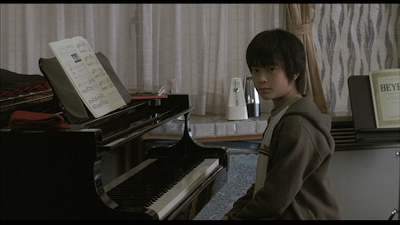Mathamma
& Goddesses
Two documentary films by
TAMIL STUDIO’S 2013 LENIN AWARD WINNER
LEENA MANIMEKALI
3rd August; 6 pm. Perks Mini Theater
Mathamma
(2003)
16 minute
documentary capturing a peculiar practice of devoting the girl children to the
deity of the folks of Arundhatiyar community in Mangattucheri village near
Arokonam, Chennai. Mathamma
triggered a successful video participatory movement, which demanded the immediate
government intervention, securing protection to women who were exploited in the
name of "culture". Film braved against the defamation cases filed by
few political outfits alleging it as a disgrace to the community's pride and
traditions and facilitated as a tool for advocacy by gender and women rights
movements.
Women
in Director's Chair Film Festival, Chicago, 2004, World Socialist Youth Forum,
Venezuala, 2005, CDIT National Video Film Festival, Trivandrum, 2003, Kolkata
International Film festival, 2004
Goddesses
(2008)
Notes from
the lives of three extra ordinary women – a
funeral singer; a fisherwoman; a graveyard workerHere is the story of three ordinary women who live extra
ordinary lives surviving darkest of times and gone against society's norms to
live and work according to the rules they have set for themselves.
Lakshmi, a professional 'funeral singer': She visits
death houses with a troop of drummers and for a measly pay, she wails and
laments and shares the grief of the other mourners. The throb of the drums and
her ankle bells resonate in the house
long after she has left.
Krishnaveni, the ‘grave-digger’: Dead unknown earn her
the daily meal. Veni accepts unclaimed bodies from the local Police and gives
them a decent burial or cremation, digging and maintaining the graves herself.
Sethuraku, the ‘fisherwoman’: What is normally considered
as taboo for women is confidently done by this lady. She goes out to sea, every
morning with a few fellow fisherwomen to collect fish and prawns, singing to
welcome the day.
Nominated for Horizon Award, Munich International Film festival, 2008,
Mention, IAWRT International Documentary Film Competition, Women Building Peace, Nairobi, Kenya 2007,
Jury Award, John Abraham National Awards for Cinema Of Resistance, SIGNS 2007, Trivandrum, Kerala.
Best Documentary, National Competition, One Billion Eyes Documentary Film Festival 2008
Official Selection, International Competition, Tri Continental Film Festival, South Africa 2008
Official Selection, International Factual
Competition, Roma Fiction Film Festival, Rome, 2008
Official Selection, National Competition, International Video Film Festival of Kerala, 2008
Nomination, Asia Pacific Awards, Brisbane,
Australia, 2008
Official Selection, Birds Eye View Film Festival, London, March 2009
Official Selection, Belgrade Documentary Film Festival, May 2009
Leena
Manimekalai
Leena Manimekalai is an independant Filmmaker,Poet and
actor based in Chennai, Tamil Nadu. She has nine documentary films and a
feature film to her credits. She has acted in several of her movies and has
published three anthologies of poems. She is also a much acclaimed street
theatre artist. Kanavupattarai is her publication house through which she has
published 25 titles on world cinema and literature.
Leena was born in Maharajapuram, Virudhunagar, Tamil
Nadu, India. She lost her father Prof.Dr. R. Raghupathy at a very early age and
was brought up by her mother Rama. She attended Kamaraj University, where she
obtained a graduate degree in engineering.
In her quest to contribute and raring to go, she has
penetrated her land, state and nationwide, screening her films in more than
thousand and odd forums and spaces.Women Movements, Mass Movements, Dalit
Movements, Grassroot NGO's, Civil Rights Societies, Educational Institutions,
Film Societies, Film Festivals etc. across the states have showed her films
initiating a participatory dialogue and interventions.And she is able to relate
across the line and cadre with humility and modesty having had the privilege of
invitation screenings in international platforms and conferences across United
States, UK, France, Germany, Switzerland, Norway, South Africa, Kenya, Finland,
Venezuela, Japan, Singapore, Malaysia, Sri Lanka, Belgrade etc..
After a brief
period as an apprentice Director with mainstream filmmakers and an extensive
experience as a Television Producer and Anchor, she debuted in 2001 with the
short documentary film Mathamma. Her
other films too deal with the issues of the marginalized. Parai is a film on
violence against Dalit women. She is road with her films across thousands of
villages serving her videos a tool for participatory dialogue with the masses
on compelling issues.Break the Shackles is about the effects of globalisation
on rural Tamil villages. Love Lost is about changing relationships in urban
space. Leena was inspired to do this
project while she was serving as a volunteer in tsunami-hit regions of Tamil
Nadu doing art therapy workshops for children. Altar is a documentary
intervention on child marriage customs prevailing in the Kambalathu Naicker
community in the central parts of Tamil Nadu. Goddesses follows the lives of
three extraordinary women who go against norms to succeed in usually
male-oriented careers: a fisherwoman, a gravedigger and a funeral singer. A
Hole In The Bucket takes a look at the dynamics of water crisis in the city of
Chennai in the context of families with different income levels. A Hole in the
Bucket was showcased at International Water Symposium, Stockholm, 2007.
Her first feature film Sengadal completed production in
2011. The film shows how the ethnic war in Sri Lanka had affected the lives of
fishermen in Dhanushkodi. The censor board has initially refused clearance
certificate to the film, stating that it made denigrating political remarks
about the governments of Sri Lanka and India, and uses unparliamentary
words.She had appealed to the Appellate Tribunal authorities and contested the
case legally for several months and finally got it cleared by July 2011 without
any cuts.
(Wikipedia)



















